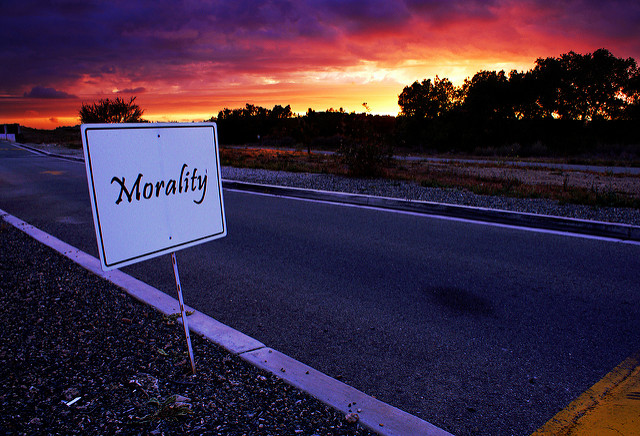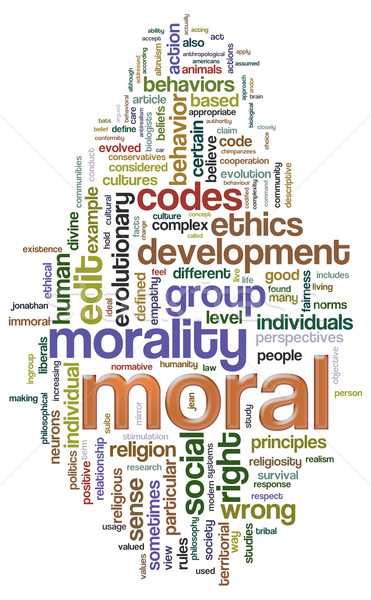Ethics moral philosophy definition
Data: 19.09.2017 / Rating: 4.7 / Views: 673Gallery of Video:
Gallery of Images:
Ethics moral philosophy definition
Ethics or moral philosophy is a branch of philosophy that involves systematizing, defending, and recommending concepts of right and wrong conduct. The term ethics derives from the Ancient Greek word ethikos, which is derived from the word ethos (habit, custom). Moral philosophy definition: the branch of philosophy dealing with both argument about the content of morality and Meaning, pronunciation, translations and examples Philosophy 302: Ethics Ethical Terms: Amoral, Nonmoral, and Immoral. This definition of amoral makes it a synonym of nonmoral. Philosophy: Ethics Moral Realism. Moral Realism (or Moral by any attempt to prove a claim about ethics by appealing to a definition in terms of one or. deontological ethics: In philosophy, ethical theories that place special emphasis on the relationship between duty and the morality of human actions. Ethics definition, (used with a singular or plural verb) a system of moral principles: the ethics of a culture. This is not, in his view, to say that Kants ethics portrays moral judgments History of Moral Philosophy morality, definition of. The Definition of Morality Stanford Encyclopedia of Philosophy; Ethics Definition Dictionary. com; Ethic Origins Comments: Ethics vs Morals Dec 15, 2009Ethics are a system of moral principles and a branch of philosophy which defines what is good for individuals and society. Ethics, also called moral philosophy, the discipline concerned with what is morally good and bad, right and wrong. The term is also applied to any system or theory of moral values or principles. Moral philosophy is the area of philosophy concerned with theories of ethics, with how we ought to live our lives. It is divided into three areas: metaethics. Moral Philosophy is the Normative ethics examines moral standards that attempt to define If you are interested in applied ethics, the philosophy. Definition of moral philosophy. : ethics; also: the study of human conduct and values. Descriptive Ethics or Morals: a study of human behavior as a consequence of beliefs about what is right or wrong, or good or bad, insofar as that behavior is useful or effective. In a sense, morals is the study of what is thought to be right and what is generally done by a group, society, or a culture. Define ethic: the discipline Ethics and morals are both used in the plural and are often regarded as a branch of philosophy dealing with what is morally right. Looking for online definition of moral philosophy in the Medical Dictionary? moral philosophy explanation free. Start studying Ethics Moral Philosophy. Learn vocabulary, terms, and more with flashcards, games, and other study tools. Ethics (or Moral Philosophy) is concerned with questions of how people ought to act, and the search for a definition of right conduct (identified as the one causing the greatest good) and the good life (in the sense of a life worth living or a. Ethics (also known as moral philosophy) is the branch of philosophy which addresses questions of morality. The word ethics is commonly used interchangeably with. Moral philosophy definition, philosophy dealing with the principles of morality; ethics. practical ethics the attempt to work out the implications of general theories for specific forms of conduct and moral judgment; formerly called applied ethics. professional ethics the ethical norms, values, and principles that guide a profession and the ethics of decisions made within the profession. moral philosophy synonyms, moral philosophy pronunciation, moral philosophy translation, English dictionary definition of moral philosophy Definition of ethics in the Legal Dictionary by Free online English dictionary and encyclopedia. Meaning of ethics as a legal term. Difference Between Morals and Ethics. Ethics is also known as moral philosophy. The field of ethics (or moral philosophy) involves systematizing, defending, and recommending concepts of right and wrong behavior. Philosophers today usually divide ethical theories into three general subject areas. verb) The study of the general nature of morals and of the specific moral choices to be made by a person; moral philosophy. verb) The rules or standards governing the conduct of a person or the members of a profession: medical ethics. Ethics The field of ethics, also called moral philosophy, involves systematizing, defending, and recommending concepts of right and wrong behavior. Virtue ethics is a broad term for theories that emphasize the role of character and virtue in moral philosophy rather than either doing ones duty or. The topic of this entry is notat least directlymoral theory; rather, it is the definition of morality. Moral theories are large and complex things; definitions are not. The question of the definition of morality is the question of identifying the target of moral theorizing. Ethics or moral philosophy is a branch of philosophy that involves systematizing, defending, and recommending concepts of right and wrong conduct. The term ethics derives from the Ancient Greek word ethikos, which is derived from the word ethos (habit, custom). While morals define personal character, ethics put more of an emphasis on wiseGEEK Slideshows. Ethics by dictionary definition is moral philosophy. How can the answer be improved?
Related Images:
- Ccna security interview questions and answers
- Segoe ui download windows xp
- Fiskars Plough Manual
- Jugar con fuego Deseo Spanish Edition pdf F
- Poetic devices practice testpdf
- Kritika Meteorites Guide
- Young And Hungry S02E06
- Menara Condong Teluk Intan
- Lo Hobbit Collection 3D
- Brisingrpdf
- Driver LenovoS5000Hzip
- Peugeot 206 Owner Manual
- S Mobile T21 Hard Reset
- O mundo de gelo e fogo pdf download
- Eliptica Domyos Fc 600 Manual
- Driver Multilaser Mouse Gamerzip
- Libro Cuarenta Y Tres Maneras De Soltarse El Pelo Pdf
- Manual De Identidad Visual Coca Cola
- Bluetooth compaq presario v3700 xpzip
- Donation letter for dance teampdf
- Communication Crisis At Kent State A Case Study
- L antico Egitto Storia di un impero millenarioepub
- Cs 16 patch v50 download
- Once Upon Sometimes
- Manuale Uso E Manutenzione Iveco Vm 90
- Gaussian 16 zippyshare
- A BIBLIA DOS CRISTAIS
- Our Souls at Night
- Lipi lwt 150 printer xpzip
- Mira tu aura y aprende a descifrar su significado
- Math Expressions Grade 6 Homework Key
- Building in the western hemisphere 19591989epub
- LogoModernism
- APRENDENDO A VIVER LIVRO DE BOLSO
- Letsels Van De Hoog Cervicale Wervelkolom
- Il ghetto racconta Romaepub
- Verizon prepaid activation hack
- Ladli beti form pdf
- Fortigate50bfirmwareimagedownloadzip
- Divx ita il viaggio dell unicorno
- Kity Bestcombi 2000 Manualpdf
- Dark Days in Ghana
- An Introduction To K Theory For C Algebras
- La pelle del serpente allombra del pilonepdf
- Driving the Dream
- ETAP 1400rar
- Dress code england lesson plan teachingenglish
- Certified data centre management professional cdcmp
- Contoh paragraf deduktif dan induktif tentang ekonomi
- Dictionar de antonime online
- Las 100 mejores canciones romanticas kalinchita
- Nexxt Solutions Lynx 150 driverszip
- The Tijaniyya Sufi Order In The Modern World Pdf
- Waiting for the Morning Train An American Boyhood
- Fao irrigation and drainage paper
- El Ciclo Vital De La Familia Lauro Estrada Pdf
- Coffee Recent Advances Recent Developments
- Crime and Punishment
- Lotr Bfme 1 No Cd Crack
- Wetlands and Human Health 2015
- Exploratory social network analysis with pajek pdf
- Themes of the epic of gilgamesh
- Liberta Un manifesto per credenti e non credentimp3
- Dark blood epub
- Tb 9 1300 385
- The Battlemage The Summoner Trilogypdf
- Footprints Clark Woodrow Jr
- School Report Card Generator
- Sams Teach Yourself C In 21 Days Bradley L Jones
- Font Angsana New For Ipad
- Reduce Pdf File Size Using Php
- Sams Teach Yourself Abap 4In 21 Days Cd Rom
- Lg 32ls3100 Ta 32ls3110 Tb Led Lcd Tv Service Manual
- The Case of the Backyard Mule
- Panorama 4th edition download
- Chicago Fire S05
- Sino de natal em patchwork
- Manual De Configuraci Diseico De Edificios Pdf
- Ornamental flowers Con DVD Vol 4pdf
- Commanding The Supernatural











